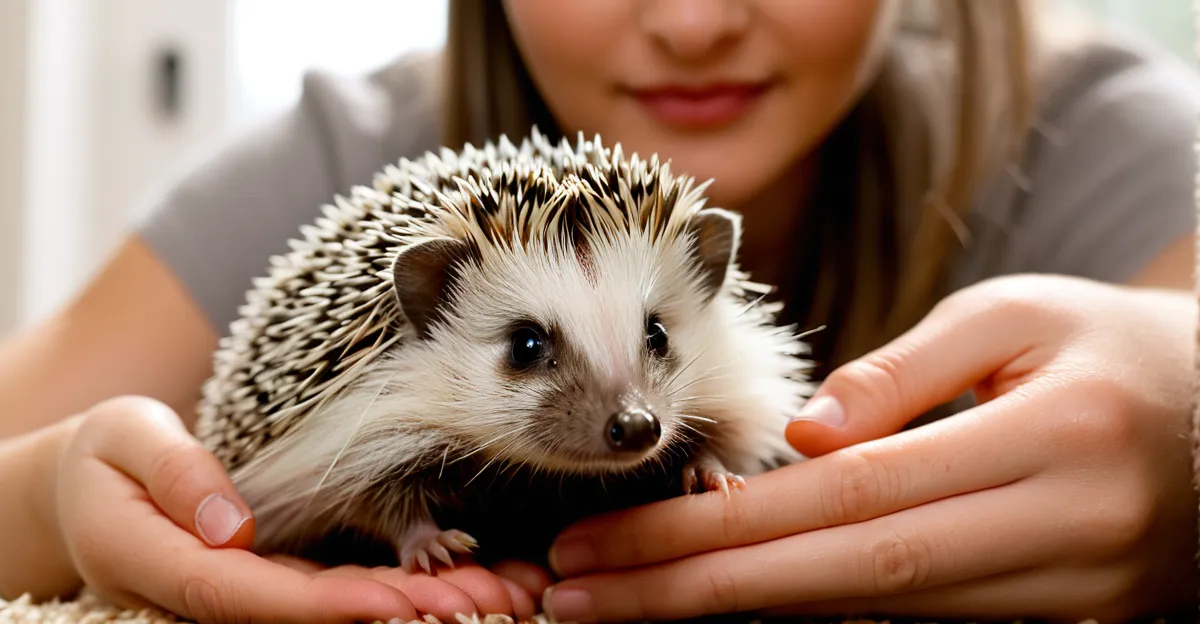Essential Housing and Environmental Needs for Pet Hedgehogs
Creating a suitable habitat for hedgehogs is fundamental for their wellbeing. The enclosure must provide hedgehog housing requirements that ensure safety, comfort, and freedom of movement. This includes secure walls and enough space to explore without risk of injury or escape. Materials should be non-toxic and easy to clean, while bedding should be soft yet absorbent to maintain hygiene.
One of the most critical factors is maintaining the correct temperature for pet hedgehogs. Hedgehogs thrive in a stable environment ideally between 72°F and 80°F (22°C to 27°C); temperatures outside this range can induce hibernation or heat stress, both dangerous to their health. Humidity should be moderate, avoiding excess dampness to prevent respiratory problems.
En parallèle : What Unique Characteristics Make These UK Pets Stand Out?
When comparing hedgehog housing requirements to other small pets, hedgehogs need a more controlled climate. Unlike hamsters or mice, which tolerate a wider temperature range, hedgehogs rely on consistent warmth to remain active and healthy. Therefore, investing in heated pads or controlled lighting is advisable to maintain an optimal living space.
In summary, a thoughtfully prepared habitat tailored to the needs of pet hedgehogs supports their physical and emotional health, making temperature control and enclosure design essential components of responsible hedgehog care.
A voir aussi : How Do Pet Owners in the UK Choose the Best Animal Companions?
Nutrition and Dietary Considerations
Understanding the hedgehog diet is crucial to maintaining their health and wellbeing. A balanced approach to feeding pet hedgehogs involves combining commercial hedgehog foods with natural sources like insects and fresh produce. Commercial diets are formulated to meet the nutritional needs of hedgehogs, offering proteins, fats, and essential vitamins. However, supplementing with insects such as mealworms or crickets provides variety and mimics their natural foraging behavior, which is important for mental stimulation.
When selecting food for hedgehogs, attention must be given to allergies and dietary sensitivities unique to these animals. Some hedgehogs may react adversely to certain protein sources or ingredients found in commercial foods, making monitoring necessary during diet changes. Introducing new foods gradually helps detect any negative reactions early and prevents digestive upset.
It is equally important to avoid foods that are dangerous or unhealthy for hedgehogs. For example, sugary, fatty, or processed human foods can lead to obesity and other health issues. Additionally, dairy products and raw meat should be excluded due to the risk of intolerance and bacterial contamination. Fresh water must always be available, ensuring hydration alongside a proper diet.
In sum, the hedgehog diet should be varied but carefully tailored, blending nutritious commercial options with live insects and fresh produce. This balanced feeding strategy supports physical health and encourages natural feeding behaviors, essential for the well-being of pet hedgehogs.
Handling, Socialisation, and Safety Measures
Proper handling hedgehogs is essential to building trust and reducing stress. Begin by approaching your hedgehog slowly, allowing it to sniff your hand before gently scooping it up from underneath rather than grabbing from above. Using both hands to support its body prevents injury and helps the animal feel secure. Repeated, calm interactions over time facilitate hedgehog socialisation, helping your pet become comfortable with human contact.
Stress reduction hinges on understanding hedgehog behaviour; they are naturally nocturnal and may be defensive when disturbed during daytime. Providing a quiet, stable environment minimizes anxiety and encourages natural behaviours such as nesting and foraging. Handling should be gentle and brief initially, gradually increasing as the hedgehog acclimates.
Safety for pet hedgehogs requires vigilant prevention of escapes and environmental hazards. Enclosures must have secure lids or walls without gaps, as hedgehogs are skilled climbers and diggers. Avoid household dangers like toxic plants, electrical cords, or open water sources. Outside play areas need supervision to protect hedgehogs from predators and harmful objects.
In essence, mastering handling hedgehogs involves patience and respect for their instincts, while robust safety for pet hedgehogs demands careful habitat design and hazard control. Together, these measures support their wellbeing and foster a rewarding relationship.
Hygiene and Cleaning Routines
Maintaining hedgehog hygiene is crucial for the wellbeing of pet hedgehogs and involves regular and thorough care. Cleaning hedgehog cages should be performed at least once a week to prevent the buildup of waste, bacteria, and odors. Spot cleaning daily by removing soiled bedding or uneaten food helps maintain a fresh environment. Use gentle, unscented cleaning products specifically designed for small animals to avoid irritations.
Bathing hedgehogs is sometimes necessary but should be done sparingly; too frequent baths can dry out their skin and cause discomfort. When bathing, lukewarm water and a mild, pet-safe shampoo are essential. Drying must be gentle and thorough to prevent chilling. Nail trimming is part of pet hedgehog maintenance and should be done regularly to avoid overgrowth, which can cause injury or impede walking.
Odour prevention hinges on diligent cleaning practices and proper cage design that allows airflow. Utilizing absorbent, hypoallergenic bedding material promotes hygiene and helps reduce smells. Combining consistent cage cleaning with appropriate hygiene care safeguards your hedgehog’s comfort and health, supporting a happy, clean living environment.
Health and Veterinary Care for Hedgehogs
Recognising hedgehog health concerns early is vital to ensuring prompt treatment and wellbeing. Common signs of illness include lethargy, loss of appetite, wheezing, nasal discharge, and abnormal stool. Changes in behaviour such as excessive scratching or quill loss also warrant veterinary attention. Vigilance helps differentiate minor issues from serious conditions that require intervention.
Regular vet care for hedgehogs typically involves annual check-ups to monitor overall health, assess dental condition, and screen for parasites. While vaccinations aren’t common for hedgehogs, preventative care such as parasite control and hygiene assessments are essential. Hedgehogs should be examined by veterinarians experienced with exotic pets to provide accurate diagnosis and treatments.
Some of the most common hedgehog illnesses include respiratory infections, skin mites, and gastrointestinal disorders. Respiratory infections often manifest with coughing or sneezing and need immediate veterinary care to prevent complications. Skin mites cause itching and crusting, requiring medicated treatments. Gastrointestinal issues, often due to poor diet or stress, may lead to diarrhoea or constipation and need dietary adjustments and hydration support.
In sum, thorough observation for symptoms combined with routine veterinary assessments safeguards hedgehog health concerns and helps manage common hedgehog illnesses effectively, ensuring your pet enjoys a long and healthy life.
Enrichment and Stimulation for Happy Hedgehogs
Creating effective hedgehog enrichment is essential for stimulating pet hedgehogs both mentally and physically. Providing a variety of toys for hedgehogs encourages natural behaviours like exploration and foraging, which are fundamental to their wellbeing. Toys should be safe, appropriately sized, and designed to engage their curious nature. Examples include tunnels, hides, and chewable objects that cater to their instinct to investigate and manipulate their environment.
To further support stimulating pet hedgehogs, integrating exercise equipment such as running wheels with solid surfaces is recommended. These help maintain physical fitness and reduce stress. Encouraging natural foraging can be achieved by hiding food or insects within safe substrates, prompting hedgehogs to search and problem-solve. This strategy mimics their wild behaviours, keeping them alert and engaged.
Preventing boredom is crucial, as understimulated hedgehogs may develop unwanted behaviours like excessive quilling or lethargy. Regularly rotating toys and modifying the environment introduces new challenges that sustain interest. Overall, a well-rounded approach to hedgehog enrichment enhances quality of life by fulfilling their instinctual needs and promoting a vibrant, healthy demeanour.
Legal and Ethical Considerations
Understanding the legal requirements for hedgehog ownership is essential before acquiring a pet hedgehog. These laws vary significantly by region, with some areas requiring permits, while others may have outright bans or specific restrictions. Compliance with local hedgehog laws ensures that owners keep their pets legally and avoid penalties. It is advisable to consult official governmental or licensing bodies to verify what regulations apply in your area.
Ethical pet hedgehog care goes beyond legality, focusing on welfare and responsible ownership. This includes sourcing hedgehogs from reputable breeders or rescue organisations rather than exotic pet traders who may contribute to unethical breeding practices. Responsible breeding emphasizes the health and genetic diversity of hedgehogs, reducing risks of inherited conditions.
Long-term commitment is a core aspect of ethical pet hedgehog care. Potential owners must consider the lifespan, dietary needs, habitat maintenance, and health care commitment required. A hedgehog’s wellbeing hinges on consistent care and attention, making impulsive ownership neither ethical nor fair to the animal. Being thoroughly informed about these responsibilities helps ensure that hedgehogs receive the dignity and quality of life they deserve.


